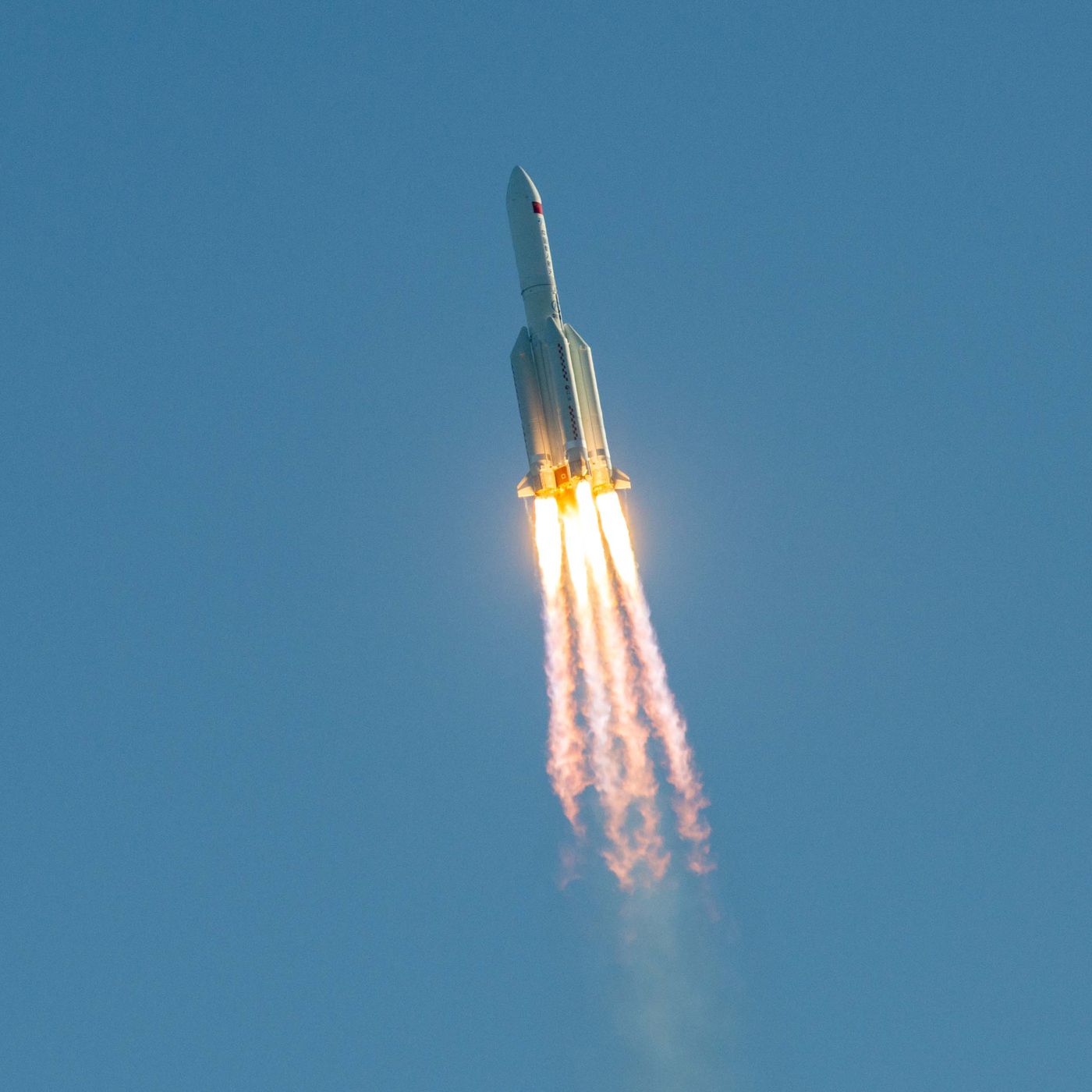ANOTHER out-of-control Chinese rocket is falling to Earth
صاروخ صيني جديد تائه يخرج عن السيطرة ويهوي باتجاه الأرض
Daily Mail
Yet another out-of-control Chinese rocket is sparking concern — a year after one of Beijing’s spacecrafts showered debris over the Indian Ocean.
Experts fear that part of a 21-ton Long March 5B rocket, which was launched to space on Sunday, may fail to fully burn up as it re-enters Earth’s atmosphere.
It would then plummet to the surface in an uncertain location and at great speed.
Although the chances of debris hitting an inhabited area are very low, many experts think that China is taking an unnecessary risk.
The country’s latest rocket blasted off from the Wenchang launch site on the southern island province of Hainan at the weekend.
It was carrying a solar-powered new lab, the Wentian experiment module, to be added to China’s growing Tiangong Space Station.
However, experts are worried that parts of the rocket’s core stage could fall to Earth — in a repeat of China’s launch last May which saw debris scattered across the Indian Ocean.
At the time, NASA Administrator Bill Nelson accused China of ‘failing to meet responsible standards regarding their space debris,’ including minimising risks during re-entry and being transparent about operations.
The rocket’s first stage was shed during the launch and will continue to loop the Earth over the coming days as it gradually falls back to the surface.
Experts say its flight path is difficult to predict because of fluctuations in the atmosphere caused by changes in solar activity.
Jonathan McDowell, an experienced tracker from the Harvard-Smithsonian Centre for Astrophysics, said US Space Command data is showing the rocket’s first stage floating on its own.
‘The inert…core stage remains in orbit and was not actively deorbited,’ he tweeted.
The problem with China’s rockets is rooted in the risky design of the country’s launch process.
Usually, discarded rocket stages re-enter the atmosphere soon after liftoff, normally over water, and don’t go into orbit.
However, the Long March 5B rocket does.
China has previously rejected accusations of irresponsibility, with the Chinese Foreign Ministry saying the likelihood of damage to anything or anyone on the ground is ‘extremely low’.
Many scientists agree with China that the odds of debris causing serious damage are tiny, although others think launch designs like the Long March 5B’s are an unnecessary risk.
Last May, one of the country’s Long March rockets broke up on re-entry above the Indian Ocean, north of the Maldives, leading to concerns that it could smash into a populated area on land.
It ultimately fell into the ocean, but Nelson still issued a strongly-worded statement which said: ‘Spacefaring nations must minimise the risks to people and property on Earth of re-entries of space objects and maximise transparency regarding those operations.
‘It is clear that China is failing to meet responsible standards regarding their space debris.’
In 2020, pieces from the first Long March 5B fell on Ivory Coast, damaging several buildings but not causing any injuries.
Wentian, a research lab dedicated to science and biology experiments, has already docked with the main body of the space station, called Tianhe.
It is set to be followed by a second research lab module, Mengtian, due to be launched in October this year.
When Mengtian attaches to the rest of Tiangong, the space station’s construction will finally be complete, although Beijing also plans to launch Xuntian, a space telescope that would co-orbit with the space station, in 2024.
Tiangong (meaning ‘heavenly palace’) will rival the ageing International Space Station (ISS), which is operated by the space agencies of the US, Canada, Russia, Japan and Europe.
It will comprise three modules, although another two spacecraft – Shenzhou and Tianzhou – which transport crew and cargo respectively, can also dock at the station.
Once completed, Tiangong space station will weigh some 66 tons, far smaller than the ISS, which launched its first module in 1998 and weighs around 450 tons.
It is expected to have a life span of at least 10 years.
وكالات
كشفت قيادة الفضاء الأميركية أن بقايا صاروخ صيني ضخم قد تسقط على الأرض الأسبوع المقبل، وأنها تتعقب مسارها لحظة بلحظة، مما يعيد إلى الأذهان ما حدث في مايو من العام الماضي عندما خرج صاروخ صيني عن السيطرة مثيرا المخاوف من مكان سقوطه على الأرض.
وأقلع صاروخ “لونغ مارش 5 ب” الذى يزن 23 طنا، والذى حمل وحدة المختبر الصيني الفضائي “وينتيان” من جزيرة “هاينان” إلى الفضاء يوم الأحد 24 يوليو، وهو بصدد العودة إلى الأرض، لكن بشكل خارج عن السيطرة.
وبعدما اكتملت مهمته بنجاح، أخذ الصاروخ مسار هبوط خارج عن السيطرة نحو الغلاف الجوي للأرض “وليس من الواضح أين سيقع” وفق ما نقلت شبكة أخبار “سي أن أن” عن قيادة الفضاء الأميركية.
وقالت القيادة الأميركية إنها تتبع سقوط الصاروخ الصيني على الأرض، وفقًا لمتحدث رسمي.
وقال المتحدث إنه بناء على الظروف الجوية المتغيرة، فإن نقطة دخول الصاروخ إلى الغلاف الجوي للأرض “لا يمكن تحديدها إلا في غضون ساعات قبل دخوله” ، لكنه كشف أنه من المقدّر أن يدخل الغلاف الجوي للأرض في الأول من أغسطس.
وكشف أن سرب الدفاع الفضائي الثامن عشر، وهو جزء من الجيش الأميركي يتتبع عمليات الدخول، وسيوفر تحديثات يومية عن موقعه.
ويمثل هذا الهبوط الخارج عن السيطرة وفق وصف مايكل بايرز، الأستاذ بجامعة كولومبيا، والذي ألف دراسة حديثة حول مخاطر وقوع ضحايا من الحطام الفضائي، الحالة الثالثة لصواريخ صينية أخفقت في هبوط متزن، ما يشكل دليلا آخر على صحة التهم الموجهة لبكين بـ”عدم التعامل مع الحطام الفضائي بشكل صحيح”.
وأوضح بايرز أن الحطام الفضائي يشكل خطرًا ضئيلًا للغاية على البشر، ولكن من الممكن أن تتسبب الأجزاء الأكبر في الضرر إذا هبطت في مناطق مأهولة.
وقال إنه بسبب الزيادة في النفايات الفضائية، فإن هذه الفرص الصغيرة أصبحت أكثر احتمالا، خاصة في جنوب الكرة الأرضية، وفقا لبحث نُشر في مجلة Nature Astronomy Journal ، حيث زاد احتمال هبوط أجسام الصواريخ بثلاث مرات تقريبًا.
وأضاف في حديث لـ”سي أن أن” أنه يمكن تجنب هذا الخطر تمامًا نظرًا لأن التقنيات الموجودة الآن توفر عمليات إعادة دخول خاضعة للرقابة (عادةً في مناطق نائية من المحيطات) بدلاً من عمليات إعادة دخول غير خاضعة للرقابة وبالتالي عشوائية بالكامل”.




